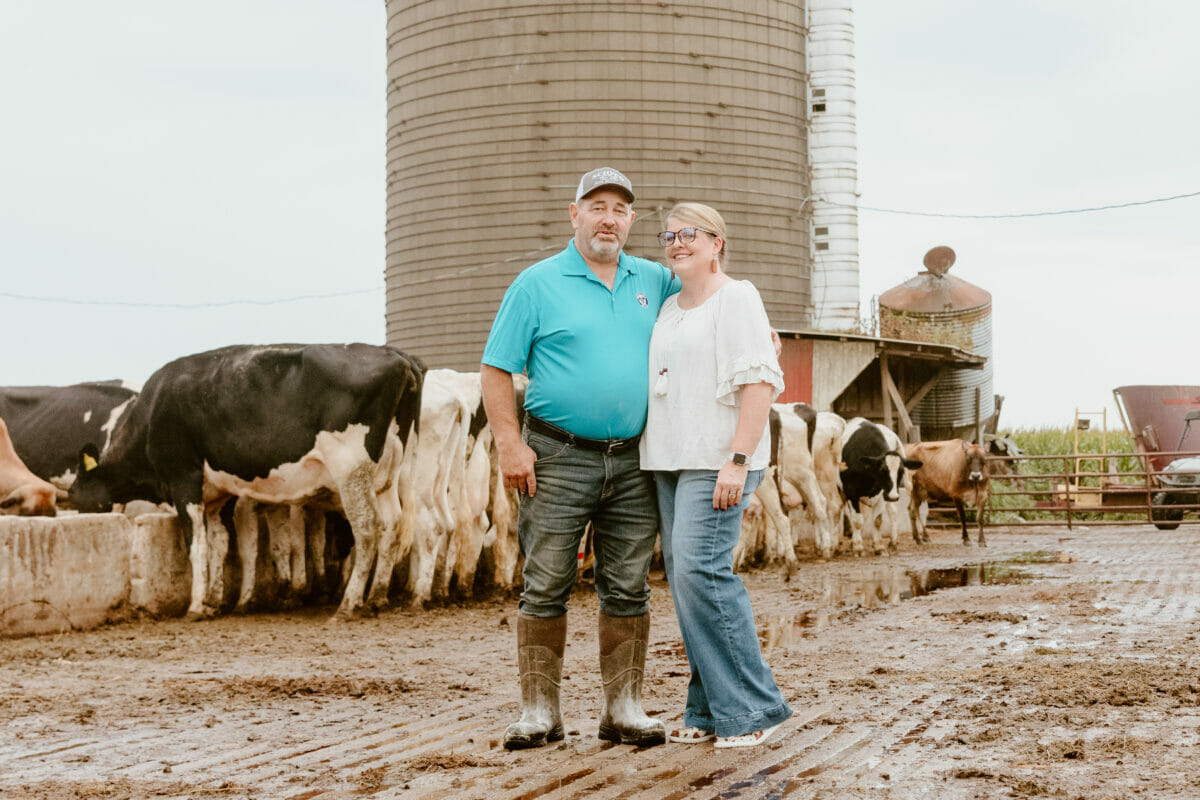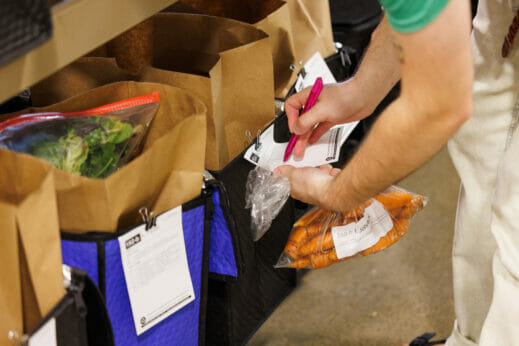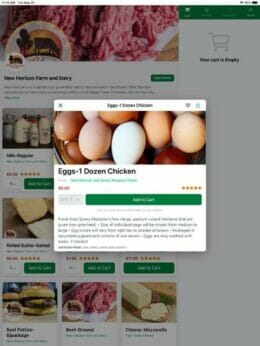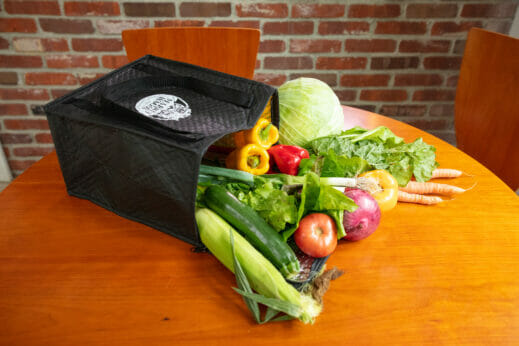In the Midwest, a growing service brings local food to your doorstep, fortifying community farms in the process.

In the age of DoorDash and Instacart, the concept of getting groceries delivered to your doorstep is not unfamiliar. But for the Bickel family, which runs New Horizon Farm and Dairy in New Vienna, Ohio, it proved to be life-changing.
Jackie and Donald Bickel inherited their dairy farm from Donald’s father, and they were raising their own kids in the dairy life. But, by 2018, Jackie and Donald were starting to talk about finding a way out. The Bickels sold their milk to a co-op and, economically, it wasn’t proving feasible.
“In 2018, milk prices were equivalent to what my father-in-law was receiving in the 1980s,” says Jackie Bickel.
And they weren’t the only ones—many nearby dairy farms in Ohio had closed up shop over the previous years after struggling against low prices.
Fortunately, the Bickels’ daughter, Maggie, had an idea. As part of a Future Farmers of America (FFA) project, she came up with a business plan for saving the farm that entailed making the switch to retail—selling milk directly to customers. If they did that, they could turn a profit and stay in business. But they’d need a few things: certification to sell, bottling equipment and a customer base.
They started selling their other products, such as beef and eggs, directly to consumers on a platform called Market Wagon. Market Wagon is a food delivery service for farm products. The Bickels knew that if they established a presence on the platform with their other items, they’d have customers waiting when they were ready to sell milk.
Maggie’s plan ended up winning an award in a national FFA entrepreneurship competition. And her parents agreed that it wasn’t just a good student project—it could actually work.
And it did.
Farm to front door
Market Wagon functions as an online farmers market, allowing the Bickels to tap into a group of consumers who want to buy directly from producers. In 2020, the Bickels started selling milk under the label Happy Cows Creamery. They offered standard, fresh milk, but they eventually also added fun flavors such as orange creamsicle, chocolate and strawberry. They also use Market Wagon to sell products such as soft cheeses and rolled butter.
“We started delivering the milk through Market Wagon and we haven’t looked back since then,” says Bickel. She adds that the dairy exit strategy they had once been contemplating is not even on the table anymore.
Here’s how it works: Farmers update the site with what they have for sale that week—fresh produce, dairy, meat, prepackaged meals and more. Customers shop across categories and vendors. They submit orders by a pre-set deadline, and farmers take their items to the Market Wagon hub in their area.
“For a Tuesday delivery, about one in the morning on Monday, we receive what’s called a ‘pick list’ from Market Wagon,” says Bickel. “It’s basically a list that is broken down by customer and it is also broken down by product. So we have a whole day to assemble the orders.” She drives the order in, disperses the items amongst the individual customer tote bags, and then heads back home.
Gig drivers then deliver the items to their destination. This process happens weekly or biweekly.

Individual customer orders are assembled at local Market Wagon hubs. (Photography courtesy of Market Wagon)
Grocery delivery is nothing new, but many produce delivery systems rely on national supply chains. Some, such as Farmhouse Delivery, offer a similar farm-to-doorstep model rooted in Texas agriculture, but they also offer certain items from out of state. As opposed to a typical grocery delivery service like Instacart, Market Wagon aims to keep things as local as they would be at an in-person farmers market while using its online marketplace to aggregate at a scale that is difficult through traditional methods.
“You would have to go to a farmers market every night to reach the number of people that you do through Market Wagon,” says Bickel.
Customers buy directly from producers, just like in a physical farmers market. But there are differences, too: Farmers only bring what they’ve already sold to the hub, instead of having to guess what they’ll sell that day.
“There is a pipeline from local farms and makers to consumers, but it’s narrow and twisty,” says Dan Brunner, co-founder and chief executive officer of Market Wagon. “And we’re here to widen that pipe.”
Farmer to consumer
Brunner says a lot of consumers long to know where their food is coming from. And while farmers markets allow you to look your grower in the eye, Market Wagon tries to keep personal touches as part of its technology, by allowing for direct communication and emails between consumers and farmers.
“As an online marketplace, technically, we don’t need to replicate that—we can’t totally replicate that,” says Brunner. “But enabling consumers to ask those questions and get answers is a central thing that we felt like we just couldn’t live without.”

Screenshot of Market Wagon order screen. (Photography courtesy of Tom Hodson)
But, in practice, the online community does sometimes spill over into the real world. Bickel says they have a loyal customer base now and often have their Market Wagon regulars come visit the dairy, see the baby calves and pick up items at their farm stand.
“Now more than ever, it is so imperative for us to have a voice with the consumer,” she says. “So, we love to talk with our customers and answer questions.”
Market Wagon does not ship anything—everything is kept within a tight radius of where it’s grown or raised or made.
“It’s really a unique business model, because, instead of building a national distribution pattern for the same products, we are actively trying to have a different supply chain in every single place we’re operating,” says Brunner.
Tom Hodson is a loyal customer of New Horizon Farm and Dairy’s Happy Cows Creamery through Market Wagon. He orders weekly and favors their eggs and baked goods. Hodson, descended from farmers and an advocate of eating locally, likes that Market Wagon allows him to know exactly where his food comes from and how it was grown.
“What you see on the screen is exactly what ends up getting delivered in your order,” says Hodson.
In his retirement, Hodson has also begun driving for Market Wagon twice a week, and he says he hears that same sentiment echoed by many of the customers he meets. They like buying directly from local farmers.

Market Wagon tote bag with produce. (Photography courtesy of Market Wagon)
Pre-pandemic, Market Wagon existed in six markets in Indiana and Ohio. But the advent of COVID-19 highlighted the benefits of having groceries delivered to your door. Today, Market Wagon is in about 25 markets overall in the Midwest. Brunner foresees continual expansion into areas that could use a service like this—aimed at helping farmers thrive in their local markets.
This fortified resiliency is something that Bickel can attest to. Thanks to Maggie’s business plan and the resulting partnership with Market Wagon, her second-generation dairy farm appears to have a future as a third-generation dairy farm.
“We’re just trying to be as sustainable as possible with every resource that we have so that the farm is available for the next generation and the generation after that,” says Bickel.
This is so brilliant, such an obvious win/win scenario. I hope that many dairy farmers see this potential, as many like me would only ever buy milk from the source, never pasteurized/homogenized commercial milk.
Add to that locally grown produce and eggs? Who could resist that? I’ll be sharing this article with a Texas dairy I used to do business with before moving overseas.